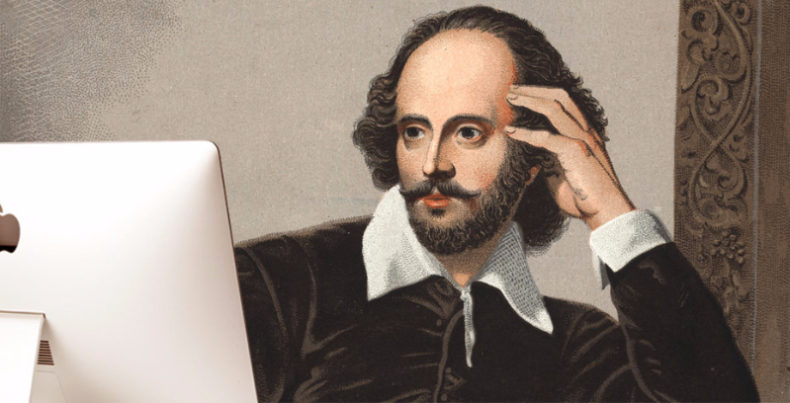 This past Saturday, the world celebrated the birthday of a guy named William Shakespeare. He was born in Stratford-on-Avon in England on April 23, 1564, and died on or about the same date in 1616. Pretty much every reputable Shakespeare scholar and literary historian argues—based on historical evidence—that this William Shakespeare was the author, alone or in collaboration, of the plays we know today. But since at least the mid-1800s, a few of those who love Shakespeare’s plays have insisted otherwise.
This past Saturday, the world celebrated the birthday of a guy named William Shakespeare. He was born in Stratford-on-Avon in England on April 23, 1564, and died on or about the same date in 1616. Pretty much every reputable Shakespeare scholar and literary historian argues—based on historical evidence—that this William Shakespeare was the author, alone or in collaboration, of the plays we know today. But since at least the mid-1800s, a few of those who love Shakespeare’s plays have insisted otherwise.
Shakespeare, these dissenters say, was just a frontman for the plays’ true author or authors, who were surely more educated, better traveled, and more distinguished than the glover’s son from Stratford. This is a minority view, to be sure, but it’s kind of like climate-change denialism—it’s sustained by a few prominent backers, some real and imagined uncertainties, and we the media’s love of controversy.
I don’t know if it really matters whether Shakespeare the man wrote Shakespeare’s plays. We have the plays, and the play, as someone or other said, is the thing. And as a purely recreational appreciator of Shakespeare, I’m in no position to argue the authorship question point by point (far more knowledgeable people have done so here and here, and the multi-generational back-and-forth is thoroughly summarized here). But as a journalist, I’ve always been annoyed by this kerfuffle.
In a joint interview this week on NPR, the renowned Shakespearean actors Derek Jacobi and Mark Rylance ticked off the usual arguments against Shakespeare having written Shakespeare: The real author of Shakespeare’s plays, they said, would have to have had an “easy familiarity” with the ways of the nobility, fluency in multiple languages, and an extensive education in a wide range of subjects.
To me, this is like saying that if a journalist writes competently about science, he or she must have a Ph.D. Journalists—and all kinds of writers, fiction and non—are constantly borrowing authority, becoming temporary experts on a place, or a field of knowledge, or a group of people. We learn as much as we can as fast as we can, mostly by asking lots and lots of nosy questions. We communicate what we’ve learned as clearly and accurately as possible, and then we move on to a new story, sometimes about the same field but sometimes about something completely different. We’re serial experts, and professional amateurs. I suspect Shakespeare was too.
Both Jacobi and Rylance scoffed at the notion that Shakespeare could have learned about foreign countries such as Italy from travelers, or even from the books available in England at the time. “The knowledge displayed comes from somebody who had to have been there. It wasn’t knowledge that was picked up talking to a sailor in a pub,” said Jacobi. Rylance pointed out that a grove of sycamores mentioned at the beginning of Romeo and Juliet is known to have existed outside the walls of Verona, near the very gate mentioned in the play. Shakespeare couldn’t have learned about that grove by talking to a returning traveler, he said; anyone just back from Italy would have described the statues and the architecture, not a bunch of trees outside Verona.
Now, I hate to pick a fight with Rylance, who I would happily watch the heck out of any day of the week. But I seriously doubt that Shakespeare was a passive listener. I bet he was as annoying as any journalist: “Oh, you went to Verona? What’s it like? There are walls? With gates? How many? What’s outside the walls? Oh, a forest? Of what? Which gate did you say it was next to?” I bet he asked and asked and asked until he got thrown out of the bar. It’s what writers learn to do.
Shakespeare didn’t learn everything there was to know about foreign lands and court practices. One of the many arguments in favor of his authorship, in fact, is that he got plenty of details wrong. But he learned enough to do what he set out to do, which was to cast a spell on his audiences. And he got that part exactly right.
Top photoillustration by Wellesley College. Used with kind permission.
I agree and would actually go even further. There’s no way the author had ever actually been to Verona. What he describes is the English aristocracy, just with Italian names. In all his plays, the characters are always just really English while having the trimmings of foreign-ness. Exactly the way I would write a story about, say, Egypt. I get a bunch of silly details and then tell an American story set in front of those details.
Excellent well reasoned piece!